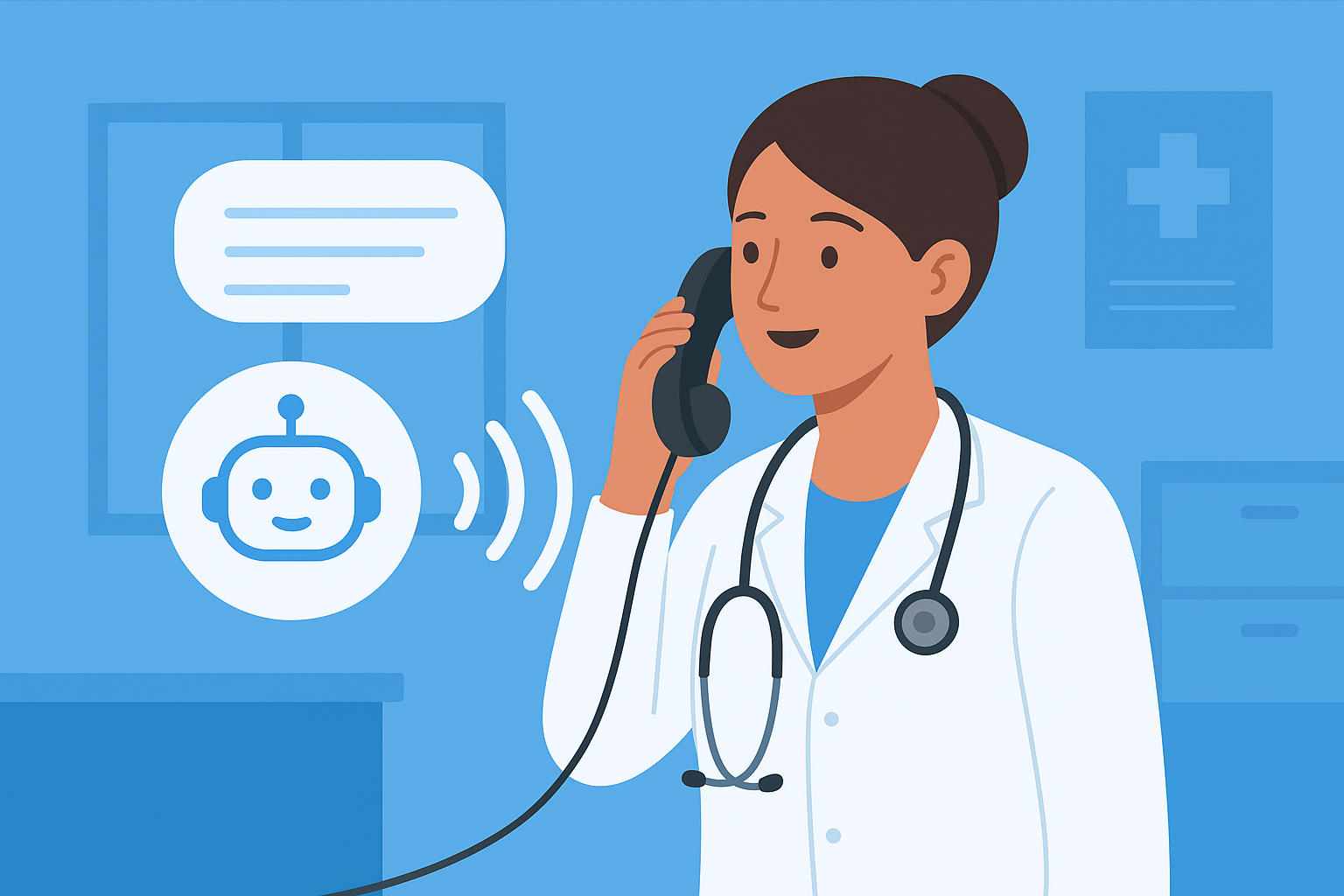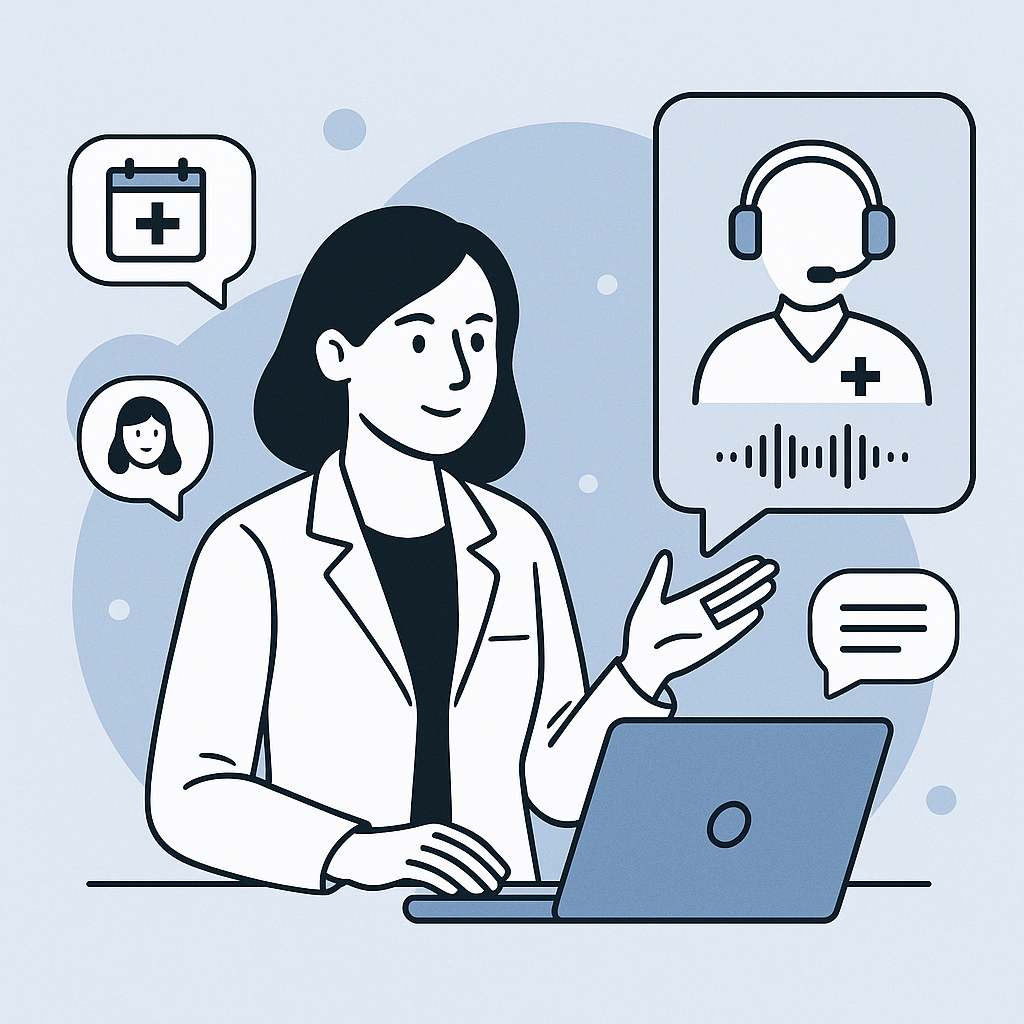In healthcare, patient engagement is more than just answering phone calls or scheduling appointments; it’s about building trust, improving communication, and delivering a seamless patient experience. For decades, the first point of contact for patients has been a reception call, where staff manually handle inquiries, confirm appointments, and assist.
If you are looking for the right Voice AI assistant for the health industry, then fill up the form right away!
However, with rising patient expectations and advancements in AI-powered healthcare solutions, a new player has entered the field: Voice AI virtual assistants. These intelligent systems can handle thousands of patient interactions simultaneously, offering personalized, efficient, and round-the-clock support.
This blog explores the shift from traditional reception calls to Voice AI, evaluating which delivers better patient engagement in today’s digital-first healthcare landscape.
The Role of Reception Calls in Patient Engagement
Reception calls have long been the backbone of patient-provider communication. A friendly receptionist answering the phone creates a sense of familiarity and trust. Receptionists typically:
- Schedule and confirm appointments.
- Provide directions and basic information.
- Answer general patient queries.
- Handle urgent calls and escalate when necessary.
While effective, this traditional method faces challenges in today’s fast-paced environment. Limited staff availability, call wait times, language barriers, and human error often hinder smooth engagement.
Key Statistics:
- According to a study by Accenture, nearly 68% of patients report frustration due to long call wait times at hospitals and clinics.
- Another survey shows 30% of patients fail to connect on the first attempt when calling healthcare providers, leading to missed opportunities for care and follow-ups.
The Rise of Voice AI in Healthcare Communication
With digital transformation reshaping healthcare, Voice AI virtual assistants have emerged as a smarter, scalable solution. These AI-driven systems use natural language processing (NLP) to understand and respond to patient queries in real time.
How Voice AI Engages Patients:
- 24/7 availability – No missed calls or office-hour restrictions.
- Automated scheduling – Patients can instantly book, reschedule, or cancel appointments.
- Multilingual support – Breaking communication barriers for diverse populations.
- Personalized reminders – Automated confirmations, follow-ups, and health check reminders.
- Reduced workload – Front desk staff can focus on complex cases instead of repetitive queries.
Key Statistics:
- Research by Markets and Markets predicts the global healthcare virtual assistant market will reach $5.2 billion by 2028, growing at a CAGR of 22.5%.
- A study shows Voice AI can reduce no-shows by up to 25% through consistent reminders and confirmations.
Why Voice AI Delivers Better Patient Engagement?
1. Seamless Accessibility
Patients no longer want to wait on hold. Voice AI ensures instant responses, allowing patients to access healthcare information anytime, anywhere.
2. Personalization at Scale
While a receptionist can remember details of a handful of patients, Voice AI can track, store, and recall personalized data for thousands of patients, delivering custom reminders and tailored support.
3. Error-Free Communication
Manual calls are prone to errors, misheard names, incorrect dates, or forgotten follow-ups. Voice AI eliminates such errors by standardizing communication workflows.
From Burnout to Balance: How Healthcare Automation Transforms Workflows?
4. Multilingual and Inclusive Care
With Voice AI, healthcare providers can serve diverse populations in multiple languages, ensuring no patient feels left out due to language barriers.
5. Cost-Effective Solution
Hiring and training reception staff is costly. Voice AI offers a long-term ROI, reducing administrative overhead while increasing engagement efficiency.
Real-World Impact of Voice AI on Patient Engagement
Case Example: Allure Medical (with 14 offices) partnered with an AI healthcare assistant to streamline appointment confirmations. Before AI, staff spent hours daily making manual calls. After implementing Voice AI, they achieved:
- 25% boost in appointment confirmations.
- Significant reduction in staff workload.
- Higher patient satisfaction due to faster, automated communication.
This shows how Voice AI not only supports patients but also empowers healthcare teams.
Read out the Allure Medical Collaboration with Voiceoc Case Study here!
Challenges and Considerations in Adopting Voice AI
While Voice AI offers transformative benefits, providers must address:
- Data security & HIPAA compliance – Protecting sensitive patient information.
- Integration with EHR systems – Ensuring smooth data flow.
- Human touch balance – Maintaining empathy where AI falls short.
Healthcare providers adopting Voice AI should ensure it complements staff efforts, not fully replaces them. The best results come from a hybrid model, AI handling repetitive tasks while humans focus on complex care.
The Future of Patient Engagement: Blended Care Models
The debate is not about eliminating receptionists but empowering them with AI tools. A blended approach ensures:
- Patients get instant AI-driven responses for routine queries.
- Reception staff dedicate more time to sensitive or complex cases.
- Healthcare organizations achieve higher efficiency, lower costs, and improved patient satisfaction.
Future Outlook:
- By 2030, it’s predicted that 70% of patient-provider communication will be AI-assisted, while 30% will require direct human interaction.
- Clinics that adopt Voice AI early will gain a competitive edge in patient loyalty and operational efficiency.
How Voiceoc is Redefining Patient Engagement with Voice AI
Voiceoc is a healthcare-focused Voice AI platform designed to simplify patient communication and reduce the burden on front-desk staff. Acting as a 24/7 virtual receptionist, it manages scheduling, confirmations, and reminders while engaging patients in a natural and supportive way. With features like multilingual conversations and seamless EHR integration, Voiceoc ensures every patient feels connected and cared for. Clinics using Voiceoc have reported fewer no-shows, higher satisfaction rates, and improved overall efficiency—making it a powerful partner in transforming patient engagement.
Connect with Voiceoc health experts for a 30-minute free consultation session!
Conclusion
Patient engagement has come a long way, from waiting on reception calls to interacting with AI-powered voice assistants. While traditional reception calls have their strengths in human empathy, Voice AI brings efficiency, personalization, scalability, and 24/7 availability, qualities essential in modern healthcare.
The future lies in a balanced approach, where Voice AI handles repetitive workflows and human staff focus on delivering compassionate care. For healthcare providers looking to improve patient satisfaction and reduce operational bottlenecks, adopting Voice AI is not just an option; it’s a necessity.




.png)







